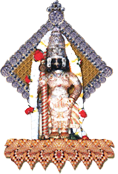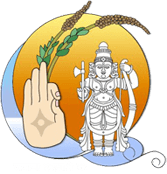हतॊ वा प्राप्स्यसि स्वर्गं जित्वा वा भॊक्ष्यसॆ महीम्
तस्मात् उत्तिष्ठ कौन्तॆय युद्धाय कृतनिश्चयः ॥ २.३७ ॥
ಹತೋ ವಾ ಪ್ರಾಪ್ಸ್ಯಸಿ ಸ್ವರ್ಗಂ ಜಿತ್ವಾ ವಾ ಭೋಕ್ಷ್ಯಸೇ ಮಹೀಮ್
ತಸ್ಮಾತ್ ಉತ್ತಿಷ್ಠ ಕೌಂತೇಯ ಯುದ್ಧಾಯ ಕೃತನಿಶ್ಚಯಃ || ೨.೩೭ ||
hatO vA prApsyasi swargaM jitvA vA bhOkShyasE maheem
tasmAt uttiShTha kauMtEya yuddhAya kRutanishchayaH || 2.37 ||
If slain, you will attain swarga, if victorious you will enjoy the earth; therefore O Kunti’s son, standup with the determination to fight
kauMtEya hataH vA swargaM prApsyasi
Oh Son of Kunti, if yo die in battle you will attain Swarga.
jitvA vA maheem bhOkShyasE
If you win the battle you will get the land here (and later Swarga also) and its pleasures.
tasmAt yuddhAya kRutanishchayaH uttiShTha
Therefore, having prepared for waging war, rise up and be prepared.
Points:
{b}1. Gita Vivriti
Sri mantralaya Prabhu raises a doubt when the verse is read as it is. It may lead to absurdity also.
a. If you win, you get this world and itspleasures.
b. If you are defeated you get Swarga. This seems to be the meaning when it is read as it is.
In such a case, the happiness in Swarga is much more with respect to time and quality and status. Hence victory shuts the door of heavenly gates. So defeat becomes more covetable than success.
For this Vivriti explains
Victory not only gets lands now, bit also Swarga later.
2. This verse answers three objections raised earlier and is all comprehensive.
a. In verse 2:6, Arjuna discouraged war , since if war was fought he was not sure of success.
Assuming success will not be gained, this verse states that there is no need to lament as Swarga will be attained by Arjuna.
b. In verse 2:7, Arjuna expressed to Shri Krishna his utter inability to take decision, begged Him to guide Arjuna about the proper course to be taken.
In this verse Shri Hari guides Arjuna to fight the war and reveals His Will.
c. In verse 2:8, Arjuna states that though he may get sovereignity of Earth and heavenly royalty of Gods, still he desists from war because he was unable to bear and face the sorrow.
This verse 2:37 says tasmAt = therefore.
As Shri Krishna has given all reasons and authorities for Arjuna not to feel sorrow or grief, Arjuna has no ground to feel grief and has no basis to reject Earthly and Heavenly bliss.
3. Advaita schools says that this war was to be fought keeping in mind Swarga and Kingdom. Hence Lord Krishna approves Kamya karma and not doing this will result in sin.
But non-performance of Kamya larmas does NOT lead to sin. However in verse 2:33 clearly say that the result of not waging this dharmic war is sin.
atha chEt tvaM imaM dharmyaM saMgrAmaM na kariShyasi
tataH swadharmaM keertiM cha hitvA pApaM avApsyasi || 2.33 ||
For this advaitists contend that if after staring Kamya Karma, it is NOT finished, it leads to sin. However the war has NOT started yet. Hence this explanation is not correct. Arjuna could have withdrawn from war.
Srimad Acharya quotes an authority from Sruti Apastamba to the effect that if a tree be grown for its fruits, it incidentally gives us shade also. On this analogy, there is no loss of dharma or sin is not accrued if duties are done in selfless spirit and it incidentally brings in rewards, which are unsought. Thus the throne and heaven indicated here are incidental rewards which the Lord points out. But the blissful great Shri Hari has never committed Himself here that these rewards are themselves to be aspired for.
Every duty can be done in selfless spirit or with selfish motives. Bhima fought and killed Jarasandha and offered to Shri Krishna as an Yajna offering, but getting Magadha kingdom is only a byproduct.


